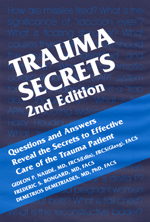I. TRAUMA BASICS
Prehospital Trauma Care
Trauma Scoring Systems
Airway Management in Trauma
Shock and Resuscitation
Mechanisms of Wounding Ballistics
Hemodynamic Monitoring of Shock and Circulatory Dysfunction
Mechanical Ventilation
II. HEAD AND NECK TRAUMA
Brain Injury
Maxillofacial Trauma
Traumatic Ophthalmologic Injuries
Ear, Nose, and Throat Injury
Penetrating Neck Injuries
Spinal Injuries
III. THORACIC TRAUMA
Penetrating Chest Trauma
Blunt Chest Trauma
IV. DIAPHRAGM AND ABDOMINAL TRAUMA
Diaphragm Injuries
Principles of Abdominal Trauma
Abdominal Compartment Syndrome
V. GASTROINTESTINAL TRACT
Liver and Biliary Injuries
Splenic Injuries
Gastric Injuries
Duodenal and Pancreatic Trauma
Traumatic Injuries to the Small Bowel, Colon, Rectum, and Anus
VI. GENITOURINARY TRAUMA
Genitourinary Trauma
VII. ORTHOPAEDIC TRAUMA
Soft Tissue Injuries in Pelvic Fractures
Orthopaedic Trauma
VIII. VASCULAR TRAUMA
Vascular Trauma
Cervical Vascular Injuries
Deep Venous Thrombosis
IX. Endocrinology
Endocrine Problems in Trauma
X. SURGICAL ISSUES
Plastic Surgery
Surgical Nutrition
XI. SPECIAL TYPES OF TRAUMA
Burns
Chemical Burns
Electrical Burns
Soft Tissue Injuries and Crush Syndrome
Hypothermia
Family Violence: Child Abuse, Domestic Violence, and Elder
Abuse
XII. SPECIAL POPULATIONS
Pediatric Trauma
Trauma during Pregnancy
Trauma in the Elderly
Alcohol and Acute Withdrawal
HIV/AIDS and Trauma
XIII. DIAGNOSTIC MODALITIES
Computed Tomography, Magnetic Resonance Imaging, & Peritoneal
Lavage in Injuries
Ultrasound in Trauma
Wound Exploration and Precautions in the Management of Trauma
Patients
XIV. POSTTRAUMATIC ISSUES
Psychiatric Aspects of Trauma
XV. MISCELLANEOUS
Physical Diagnosis: Foreign Body and Evidence
A Potpourri of Trauma Questions


